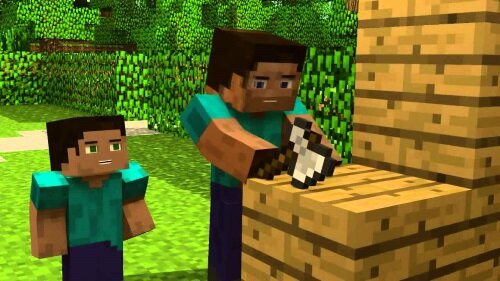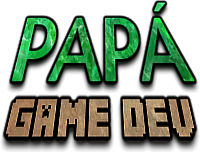“When I grow up, I want to be a Videogames Creator”

“When I grow up, I want to be a Videogames Creator”
That’s how Diego (11) presented his homework to his Fourth Grade classmates last year.
When he told me about his presentation, it wasn’t that much of a surprise for me. I felt a nice blend of pride and satisfaction and I got some flashbacks from my own childhood. I also thought a bit on Diego’s early years, and on how my older son has been a key witness of my career in this industry, that started even before he was born.
Long time ago, I already had the idea that Diego could potentially want to follow my steps. Is there any father that would not feel glad about his son willing to follow his career?
But the issue about the videogames industry is that it’s not as fun as it seems from the outside. I know that every job can be hard and I am totally aware that there are some occupations that are much tougher than working in videogames. But the tricky thing is that this industry looks super fun and cool from the outside. “You play all day long” is probably one of the things we’re told the most.
“You work in videogames! So cool to play all day long!”… Yeah, of course, you know…
Once upon a time…
Videogame industry started a long time ago, on the 60s (or the 50s or the 70s, it depends on how exactly you define that starting point). At that time, a group of brilliant people created the first electronic entertainment system that used a control and a screen. Using the control, the player would have an interactive experience that was represented on the screen, and the main goal of that experience would be to make the player have some fun. The very pure essence of a videogame.
Half a century later, the videogame industry has evolved more than anyone could foresee.
Today, there are millions of videogames on tens of platforms (the devices on which those videogames work), and there are hundreds of thousands of people creating videogames too.
It’s a super competitive industry and several markets are already saturated given the huge amount of companies and products on them. The smaller companies are literally run over by the biggest ones, with budgets that allow them to create super productions, big promotion campaigns and catch the attention of the vast majority of the consumers.
Many talented developers dream with finishing their first project or turning into a reality some super cool innovative idea, but they crash against the fact that the videogames industry is just a business. They get pushed to work on projects that are far from their dreamed ideas, just to survive. It’s also pretty common that those third party ideas are always similar and not so fun to develop, but from the business perspective they seem safer and more profitable than the innovative ideas, at least for the big stakeholders of the industry.
This bias on how the industry is perceived is so big that several articles, memes and even videos about that have appeared. My favorite is “So you want to work in the video game industry”.
But then… why are you still in videogames?
But then, if it’s so terrible, why am I still working in videogames? Why is the industry still growing and why is more people getting on board? Do I really want my son to enter an industry that, even though it’s cool, it seems to be so nasty to be a part of it?
The truth is that I work in videogames because it’s one of my biggest passions. Most of the people working on videogames actually love working on videogames.
At the end, that’s the reason that makes most of the professionals stay in the industry, despite the hard times and huge challenges. They are pushed by a kind of motivation that goes beyond their technical discipline.
My son Diego loves videogames, a lot. From Minecraft to Clash of Clans, he plays a lot of casual games and he shares them with their school mates and with me.
Fortunately, we’ve managed to teach him that it’s important to also have other activities on his life, so he also practices sports (he plays roller hockey on a league), he reads (literally swallows books like Harry Potter), hangs out with friends, enjoys his family, etc.
But of course, nothing changes the fact that he loves videogames. That passion, combined with witnessing his dad work in videogames since he remembers, has pushed him to want to do the same when he grows up.
The real question
No matter if I want or not my kid to follow my steps, what really matters to a father is that his child follows the path he chooses and, through it, that he achieves his self-fulfillment, be happy, etc. So I started to ask myself the following question:
“Is there any way I can help him?”
It seems pretty obvious that the answer is “yes”. I do have more than twenty years of experience making videogames. I also love teaching, a lot. And finally, because I know my kid (or I’d like to think so) and I feel that I am in a very good position to guide him.
But that thought threw me to another question, -the- question.
“And how can I guide and help him, without actually pushing or forcing him?”
This made me think on how did I get into videogame development. How did I move from playing videogames to making them? I owe that to my family, specially to my own father.
Once Upon a Time… again
Almost thirty years ago, my parents bought a brand new Atari 800 XL and four videogames: Montezuma (my favorite), River Raid (awesome), Moon Patrol (glorious) and a Star Wars game (that one was awful!).
It wasn’t the first time that we had videogames at home. My dad worked in something related to computers (I did not had a clue what exactly was at that time) and he sometimes brought hom a Sinclair. There was a super nice game with colored bricks and a tiny ball that hit and destroyed them, one after the other. It was incredible, marvelous, at least that’s how I remember the feeling of playing it when I was 5 or 6 years old.
But the Atari was even better because it was ours, just like the four videogames.
I’m not quite sure how long it was since the Atari arrived until we got to the D day. It may have been days or weeks, I honestly don’t recall. But that day, the D day, my dad told me he was going to show me something new. He turned on the Atari but he did not start any game. Instead, he let the Atari got into this blue screen with a white “READY” message.

Then, he typed in the following using the super ergonomic Atari keyboard:
10 PRINT "HOLA"
20 GOTO 10
RUNAnd the word “HOLA” started to appear on the screen, magically, again and again, without stopping.
Disclaimer: I don’t really remember if the PRINT actually said “HOLA” or “BLA” or something else. But the impression it caused to me is still super clear.
Then my father explained me that he had just typed a program, and that the videogames I enjoyed a lot, those Montezuma, River Raid and Moon Patrol, all of them were also programs. He told me he knew how to code programs and he offered to teach me.
And that changed everything.
Until that day, I wanted to be an astronaut or an astronomer, not sure, but something that had to do with the stars. I liked stars a lot, I knew a lot of names, sizes, constellations, distances between galaxies, etc.
But that day, I changed my mind. I wanted to write code, I wanted to learn, I wanted to create. And not any kind of program. I wanted to be a Videogames Creator.
“Dad, I want to learn to make videogames”, I said.
It’s been a long way since then. I was 7 years old.
Now that I’m 36 I can’t help understanding the fascination that Diego feels (and most of the kids of his generation) for videogames. I also understand that feeling he is starting to get about not only playing then, but also making them, just as his dad.
Papa Game Dev
Around a year ago, I decided that I wanted to write about this, for several reasons.
Because I think that it’s a pretty nice power that we have, the videogame developers, to be able to create things that entertain people. We can create characters, worlds and make people interact with them and feel a unique experience.
Because I believe that, as part of this society, we have a special responsibility about the contents that the gamers receive, especially the children.
And because, as a father, I embrace the fascinating opportunity that I have to guide my son on this path that he dreams about, and that he may actually follow as his professional career.
It took me several months to actually start this project, but today, finally, I want to share with you this new website, Papa Game Dev (Game Dev is the short for Videogame Developer)

Papa Game Dev will start as a blog about being a father and a videogames developer at the same time.
It will be about what that means for me, and what it may mean to other developers that are also parents. I am looking forward to share experiences, ideas, projects and open a conversation around this topic because I know that I’m not the only one that feels it’s important.
Also, I have the fortune of having two smaller kids, Santiago and Samanta, and they may develop the same fascination for videogames than Diego. So, thinking on them too, I’d love to learn more about other parents’ experiences and grow myself as a father.
I don’t have too many ambitions but I do have tons of ideas and good intentions. And I would like to invite you all to leave your comments, suggestions and, even better, your ideas and own experiences.
Welcome to Papa Game Dev!
Papa Game Dev was originally launched with this article in Spanish on March 2015. As I wrote at that time, I did not have any ambitions nor expectations beyond willing to share experiences and have a place to talk about topics that I feel very important.
Since then, I’ve published at papagamedev.cl around fifteen articles, one interview and one videogame review, and the site continues to get new contents on a 1-2 weeks basis. Most of the content will be also published on this English version of the site, along with some original content too.
Finally, I’d like to apologize for my written English. As a Spanish native speaker, I know I am still far for writing in English as fluent as I am in Spanish, and I am sure that this first article has a lot of errors that Microsoft Word did not catch (because it can’t do magic, of course!).
I’d very happy to receive any kind of typo/grammar/syntax/any correction in order to make the writing better. And I hope to get better with each published article. Thanks a lot in advance!
Juan Pablo makes videogames since he was 8 and he is a father since 2004. Today, he has three children and he has worked in more than 20 videogames. He got interested on how paternity and the videogame industry are related and he decided to write about it, founding "Papa Game Dev".
Leave a Comment
Your email address will not be published. Required fields are marked *

